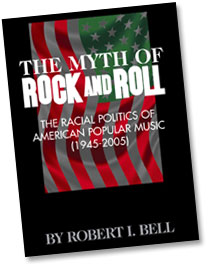FCNNEWSSOURCE

June is Black Music Month. Black musical artists have always displayed high levels of creativity and genius. Unfortunately, many of our Black artists have also been exploited by unscrupulous businessmen in a variety of ways, whether it is signing contracts that leave the artist making only pennies when the manager and company is making the real profit, forcing the artist to make music that is laced with negativity, or completely taking the musical creation of the artist and claiming it as their own.

The Final Call’s Assistant Editor Ashahed M. Muhammad went One-on-One with author Robert I. Bell to discuss his provocative and thoughtful book “The Myth of Rock and Roll” which shines light on many of these unprincipled practices while at the same time delivering solutions and important history lessons that may be of benefit to the artists of today.
The Final Call (FC) What motivated you to write a book dealing with this particular subject?
Robert Bell (RB) Primarily my frustration with the mainstream media, both White mainstream and Black. The White corporate media continually portrays Black art, music in particular, as something less or subordinate to that which is produced by Whites. Unfortunately, mainstream Black writers defer to their colleagues and accept the editorial place that media corporations allow them to operate in.
FC: Though the title mentions Rock & Roll, the book deals with all forms of music in which Black people have excelled covering the entire musical spectrum of Jazz and Blues, Funk, Disco, Hip-Hop and Neo-Soul. Why was’Rock & Roll’ chosen for emphasis in the title?

RB: Well Rock emerged from the Black music communities that were flourishing in the 1940s in the west and southwest, primarily Los Angeles. The main forms of early rock were the jump blues and the vocal harmonies of the Black singing groups. Now these two original styles of rock gave birth to all the styles of rock that developed in the 60s and 70s. The first rock and roll was technically called “Race Music” by Billboard Magazine and then changed by Billboard Magazine to R & B. In the late 40s and 50s, R & B and Rock were used interchangeably. The point is that Rock is a Black art form and is the foundation for much of what we now consider Pop, Rock and R&B. We should note that R & B is not a term that emanated from the Black community. We are typically a lot more creative when describing our art, hence jazz, hip-hop, soul, et cetera.
FC: Throughout history, others have always taken credit for the accomplishments of Black people, especially in the area of music. You dealt with this reality effectively in your book. Is this one of the reasons you wrote this book, to ensure that the true history of the impact of Black excellence and creativity in the area of music is told?
RB: Absolutely. What’s so frustrating is that throughout history, Whites have always assigned one of their own as king or the best of some music form, (in) Jazz, Paul Whiteman, (in) Swing, Benny Goodman. This is what White supremacy is about, but the story of Rock and Roll is unique because in this case they usurped an entire musical genre, not only claiming it as their own, but rewriting history to make it seem as though it is something they created.
FC: In chapter 9, you write about Hip Hop and the way it transformed the music scene, but you also discuss a “New World Order” and the reestablishment of “Jim Crow” that took place as a parallel sociopolitical reality. Please explain.
RB: Well, Jim Crow or American apartheid is simply the de facto separation of the races and in the music industry. It is obviously alive and well. As I stated earlier Rock has been usurped by White cultural elites such that their interpretation of rock music is all that you hear played on their stations. It’s so pathetic they don’t even play Prince, let alone Michael Jackson or any rap acts. Of course Negro industry “professionals” accept being put in their place and work within the constraints placed on them. The New World Order simply speaks to the dominance of hip-hop on the world stage, something the majority media refuses to acknowledge.
FC: There is The Source and Vibe and XXL and some magazines that deal with music, however, they appear to really be more interested in being marketing tools than dealing with the cultural realities of Black music. You end the book with solutions. Why do you think that corporate interests always appear to trump cultural interests in the area of music?
RB: Money, money, money. It’s sick because culture and art is so important, particularly now, when truth to power must be spoken. We just don’t have the type of visionary leaders we once did. The consolidation of the media and the closed, conservative (and) racist nature of capital and funding sources fuels the problem.
FC: You deal with the financial skullduggery and racism within the music industry. Many will say, they are in the business to make money, and the social activism and responsibility that is so often lacking in music and in the marketing of it someone else’s responsibility. Can this mindset be changed, or are the financially lucrative rewards too appealing for most to reject in favor of expressing a socially conscious musical reality that may not be as popular?
RB: Clearly, money lenders and (money) grubbers have won out so far in this contest. But, one never knows. There is so much great rap, spoken word, hip-hop, jazz, funk–Black Rock as I call it–out there that it may very well rise above the limited designs of the White American cultural abyss. The truth is there’s money to be made in the brilliance of the phenomenon known as Black Art. Let’s pray that those with the resources see the light.
FC: Thank you.
(To purchase the book visit http://www.robellpublishing.net or call 215-843-3607)












